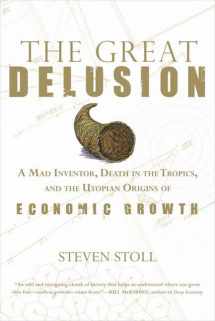
The Great Delusion: A Mad Inventor, Death in the Tropics, and the Utopian Origins of Economic Growth
Book details
Summary
Description
Economic growth is more than an observable fact—it’s a belief in the limitless abundance of the natural world. But when did people begin to believe that societies should—even that they must—expand in wealth into the indefinite future? Did they think about the limits of the natural environment?
In this vivid book, the historian Steven Stoll considers the way people throughout the Atlantic world read wealth into nature during the 1830s and 1840s. Opening among the supersized products and high-stacked shelves of Costco, The Great Delusion weaves past and present together through the life of a strange and brooding German engineer and technological utopian named John Adolphus Etzler, who pursued universal wealth from the inexhaustible forces of nature: wind, water, and sunlight. He was not a major theorist. He did not invent anything we use today. But Etzler absorbed and articulated just about every major materialist idea of the time, using those theories to pursue his own program for abundance and happiness. In Etzler we see a disturbing picture of ourselves. If he seems eccentric—or just plain crazy—he was no less so than the most pragmatic thinkers of his time, and of ours. Eloquent and insightful, The Great Delusion neatly demonstrates that Etzler’s fantasy has become our reality and that we continue to live by some of the same economic assumptions that he embraced.


We would LOVE it if you could help us and other readers by reviewing the book
Book review



